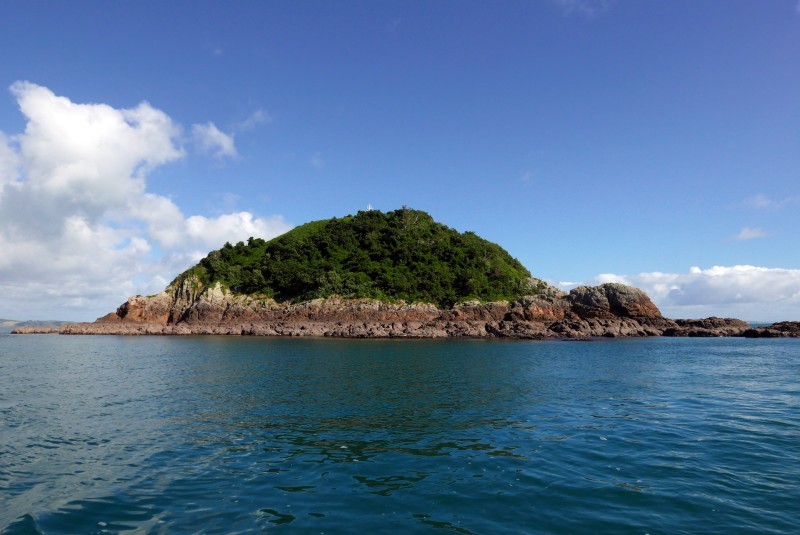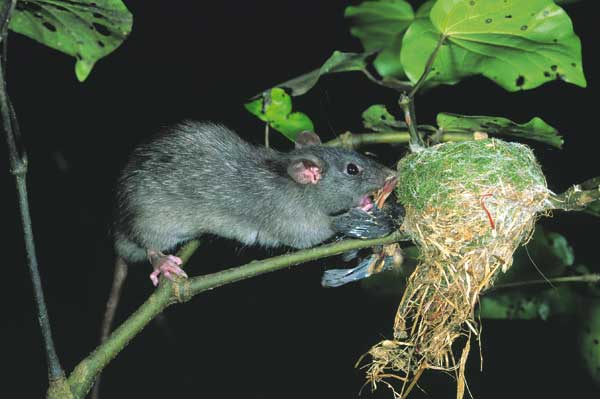Can we achieve a Predator Free New Zealand?
It has been 6 months since the announcement that New Zealand would be predator free by 2050 garnered worldwide attention. But Caroline Wood asks – how will we get there?
Forest & Bird led New Zealand’s first predator-free success story when Auckland branch member, Mr. A. McDonald, from Waiheke Island, used a £5 government grant to systematically lay warfarin rat bait across Maria Island, in the Hauraki Gulf, in 1960. Rats had reached the tiny island and were decimating the white-faced storm petrels that bred there.
Two years later the branch returned to the island with more bait to repeat the control, but found no obvious sign of rats. And in 1964, Maria Island and the nearby David Rocks, were declared the first islands in the world to have rodents permanently eradicated from them.

Forest & Bird started the predator free ball rolling at Maria Island in the Hauraki Gulf (Photo by RNZ).
Fast forward to early 2012, and Forest & Bird was again at the vanguard when we gathered 20 pest control experts to meet at our Ruapehu Lodge to discuss whether a predator-free New Zealand was a concept that could work.
“We got together in February 2012 and fleshed out the idea that Predator-Free NZ was achievable – and it was do-able by 2050,” says Advocacy and Campaigns Manager Kevin Hackwell.
A month later, having been briefed about the outcome from the Ruapehu workshop, the late physicist Sir Paul Callaghan in his last public speech called for an “Apollo programme” for New Zealand ridding the country of predators.
A lot of the groundwork has been done since then, and in July the government formally adopted the policy and committed $28 million of new money.
The reaction was quick and global when Prime Minister John Key announced the country would be free of the triple threat of possums, rats and stoats by 2050. The story was picked up internationally, with The Guardian, BBC, Al Jazeera and other media outlets contacting Forest & Bird for reaction.
How can we accomplish such a task?
Back home, the focus has turned to how can we accomplish such a task? Will there be secure funding for the next 30 years? And who will develop a much-needed national predator-free strategy?
The Government plans to form a joint-venture company called Predator Free New Zealand (PFNZ) Ltd that it will use to spearhead pest eradication efforts. It will work with communities, attract co-investors, invest in scientific research, and accelerate the scale of pest control.

Introduced mammals like rats, possums, and cats are just some of the species that predate our native wildlife (Photo by Nga Manu)
PFNZ will be a Crown entity, and one of its jobs will be to attract $2 of private sector and local government funding for every $1 of government funding. This would turn the Governments $28 million “seed money” into $84 million – or $21 million per year for the next four years.
“I’m a little bit sceptical about that,” says Kevin Hackwell. “There is a lot of hype that the private sector and businesses are going to flood into biodiversity and fund predator control. It would be lovely to think they could, but New Zealand is a small place. I can’t see the private sector putting tens of millions of dollars into conservation.
“The worry is that everything is predicated on getting this money but if it doesn’t materialise, will the government come through with the extra money?”
Then there is the question of how much of the funding will be spent on finding new predator-control techniques.
“There is a lot of talk about developing innovative new technologies. While new techniques will useful, we mustn’t waste too much time and effort in devising alternatives to existing tried and true methods,” says Kevin.
“From Maria Island to the current Battle for Our Birds, the best technique is still putting a bait in front of a hungry pest.
“If we find a silver bullet we will want to use it, no question. But the good news is that achieving the 2050 predator-free goal doesn’t require us to find it, as we already have the tools to achieve the goal. Any new technology will be the icing on the cake, and will help us achieve the goal sooner and at less overall cost.
What’s Forest & Bird’s role?
Forest & Bird started the predator-free ball rolling in 1960, and for many years our branches have been bringing back our native species by doing local pest-control work and supporting DOC in making islands predator free.
Kevin says it is vital that predators are eradicated in our urban areas if the country is going to be truly predator-free, and Forest & Bird can play a key role.
“Most of our members live in cities and provincial towns, so we will play a very important role, not only in doing the predator-control work but also by leading local conversations on its benefits.
